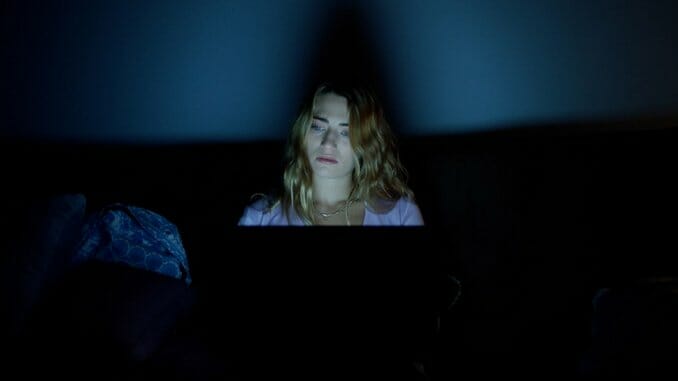Shudder’s Latest May Leave You Shook, but Not Stirred

What’s scarier than the serial murder of powerless puppers? The plutocratic dynamics of our celebrity-obsessed society! Shook, Shudder’s latest horror flick, places this question and answer at the fore of its story. When Mia (Daisye Tutor), a social media make-up artist, dog-sits for her big sister Nicole (Emily Goss) after a high-profile spree of serial dog-murders, a mysterious caller (who sounds a lot like Joel McHale but isn’t Joel McHale) coerces Mia into playing a series of games in order to stop the murders of her loved ones and save the family dog. You read that correctly.
While on the surface, Shook may appear to be a smaller-scale, Saw-esque moralistic horror movie, the film expands its gaze outside of the central framework of the game. The fear factor comes from the lengths characters go to virtue signal, gain internet attention and perform wealth, not merely from the stakes of Mia’s ability to save her friends and sister’s dog, Chico. Shook’s intriguing premise and technical choices purposefully enhance its thematic musings. Mia spends a majority of Shook home alone, but her use of social media both inserts realism and creates an empty-yet-populated spatial feeling that the film’s critiques highlight. Tutor, for her part, emotes like a champ—which is especially impressive considering she spends the majority of the film’s 90 minutes running up and down the stairs and crying at her cellphone screen. The film’s synth-heavy soundtrack sonically reinforces this technology-centric storytelling and left me repeatedly asking, “….is that LCD Soundsystem?” But be forewarned the film’s body horror and bevy of narrative twists may leave some viewers nauseous and—dare I say—shaken.
Shook opens with a red carpet event. A gaggle of social media starlets pose for photos in front of what appears to be a crowd of paparazzi. Mia enthusiastically champions Sekani cosmetics, the beauty brand hosting the event. Between the flashing lights and the luxury aesthetic, the audience is led to infer that Mia is the real deal. Then we zoom out. What appeared to be an exclusive brand launch event is actually taking place in the parking lot behind some warehouse. Sure, the camera people are real, as is the red carpet. But Mia’s adjacency to celebrity is shown to be garnered through a series of well-choreographed flexes. She and two other influencers are being photographed by a dozen photographers, tops, and there is no real event. In fact, nothing real seems to be taking place at all.
This opening sequence is an effective snapshot of Shook. For the duration of the film, Mia is forced to confront her prioritization of increased social media attention and the way it eclipses her commitment to her loved ones—her commitment to real social relationships. For example, Nicole and her late mother have Livingston’s Disease, a fictional illness that causes a deterioration of motor functions, nerve damage and reduced quality of life. It is revealed that the strain in Mia’s relationship with her sister comes from Mia’s preoccupation with social media and history of neglect towards their mother in the months prior to her death. The mysterious caller who stalks Mia uses this information against her. An additional example of Mia’s shortcoming: She only chooses to dog-sit when a prominent puppy-wielding influencer is murdered by the serial-dog killer. A supposed act of solidarity, spending an evening in with little Chico, is yet another selfish behavior that she thinks will buttress her brand.
-

-

-

-

-

-

-

-

-

-

-

-

-

-

-

-

-

-

-

-

-

-

-

-

-

-

-

-

-

-

-

-

-

-

-

-

-

-

-

-








































